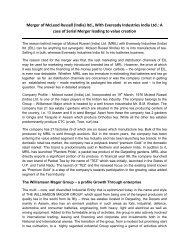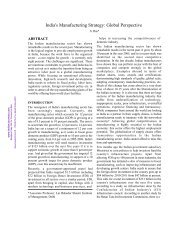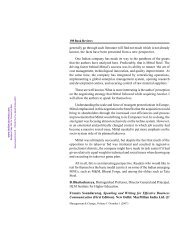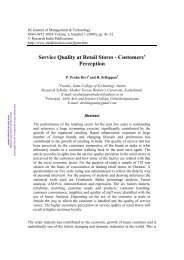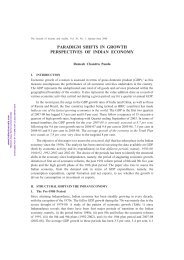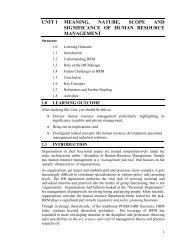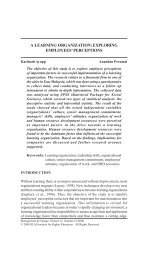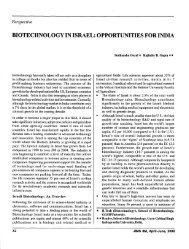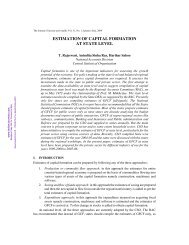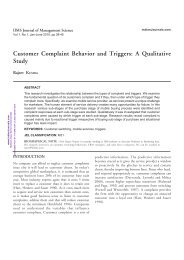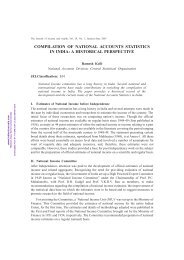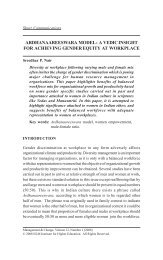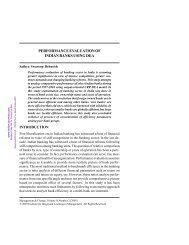Cultural Globalisation - Mimts.org
Cultural Globalisation - Mimts.org
Cultural Globalisation - Mimts.org
Create successful ePaper yourself
Turn your PDF publications into a flip-book with our unique Google optimized e-Paper software.
K SYAMALAMMA AND P KRISHNA MOHAN REDDY<br />
www.IndianJournals.com<br />
Members Copy, Not for Commercial Sale<br />
Downloaded From IP - 115.248.73.67 on dated 27-Dec-2010<br />
Globalization”, Jen Hu Chang, Guo-Ming Chen, D Ray Heisey, Yoshitaka Miike,<br />
Todd Nesbitt, Carmen de la Peza, Jan Servaes and Xu Shi, “Intercultural Symposium<br />
on <strong>Cultural</strong> Globalization”, China Media Research, Vol 2, No 3, 2006) explains<br />
that “<strong>Globalisation</strong> is often perceived in the Asian context as an inevitable process<br />
of adjustment and accommodation. It usually implies the existence of certain global<br />
trends that we need to cope with for survival and success. And such global forces,<br />
<strong>Cultural</strong> globalisation should be<br />
seen as the continual<br />
development of multiple<br />
modernities on a global scale.<br />
Transculturation should develop<br />
so that different cultures can be<br />
true to their own indigenous<br />
strengths and not be swept into<br />
a similar pattern of only one<br />
type of transformation.<br />
or waves of change, come largely from<br />
the West, notably from the United<br />
States. ... We ought to dispel the<br />
misconception of globalisation as<br />
intercultural adaptation to the West. We<br />
should realise that the significance of<br />
globalisation, cultural globalisation in<br />
particular, lies not in the power of<br />
dominance and imposition but in the<br />
possibility of creativity and interaction.<br />
In the Asian milieu, then, is it<br />
conceivable that we will actively fashion<br />
the globalisation of Asian cultures in quest of Asian collective identities and common<br />
values? … Ceaseless dialogue about the commonality and diversity of Asia will<br />
yield profound insights into the politics of Asian identities, the complexities of<br />
Asianness and the beauty of humanity. The time is ripe for us to rekindle our<br />
interest in the distinct cultural traditions of Asia, re-educate ourselves on Asian<br />
cumulative wisdom, explore the common values of <strong>Cultural</strong> Asia and articulate an<br />
Asian vision of the global village”.<br />
According to D Ray Heisey (“The Meaning and Impact of <strong>Cultural</strong><br />
Globalization”, Chang, et al, ibid) “One of the ways of looking at the problem of<br />
‘critical’ perspective. The ‘liberal’ perspective views cultural globalisation as ‘the<br />
triumph of the market economy’ and the ‘critical’ perspective views it as ‘the<br />
domination by Western or American culture’. Instead, Chan and Ma argue that<br />
cultural globalisation should be seen as ‘the continual development of multiple<br />
modernities on a global scale’. They think that transculturation should develop<br />
around the globe so that different cultures can be true to their own indigenous<br />
24<br />
WORLD AFFAIRS WINTER 2009 VOL 13 NO 4



